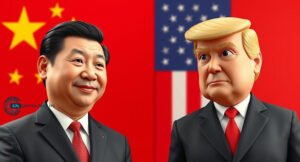In a bold move that could redefine global trade, former U.S. President Donald Trump has announced the implementation of ‘reciprocal tariffs’ on all trading partners. This policy ensures that the U.S. will impose tariffs matching those placed on American exports, aiming to establish what his administration calls a ‘level playing field.’
LIBERATION DAY RECIPROCAL TARIFFS 🇺🇸 pic.twitter.com/ODckbUWKvO
— The White House (@WhiteHouse) April 2, 2025
With the immediate imposition of a 10% import tariff and a 25% tariff on all foreign-made vehicles, global markets have responded with volatility. Traditional financial institutions brace for impact, while the crypto market watches keenly. Could this be another defining moment for Bitcoin (BTC), Ethereum (ETH), and stablecoins to prove their resilience in an uncertain economic climate?
Trump: “This Will Lead to U.S. Economic Growth”
As part of the announcement, Trump stated that these tariffs will stimulate domestic production and economic growth in the U.S., aiming to counteract unfair trade practices, currency manipulation, and trade barriers imposed by foreign nations.
Crypto: The Ultimate Hedge Against Trade Wars?
Trade wars often lead to currency fluctuations, capital controls, and market instability, making cryptocurrencies an attractive alternative for investors and businesses alike.
- Bitcoin (BTC) is often regarded as ‘digital gold,’ offering decentralized security and a fixed supply, making it resistant to inflationary pressures.
- Ethereum (ETH) remains a critical player, with its DeFi (Decentralized Finance) applications allowing users to bypass traditional banking systems.
- Stablecoins (USDT, USDC) could emerge as a preferred cross-border payment solution, enabling businesses to avoid restrictive financial policies.
Could Tariffs Push Institutional Investors Into Crypto?
Institutional investors have historically turned to gold during economic crises, but the rise of Bitcoin ETFs and increased crypto adoption could change that trend.
- MicroStrategy, Tesla, and other corporate giants have already allocated billions to BTC.
- BlackRock’s Bitcoin ETF witnessed record inflows as market instability grew.
- DeFi protocols provide a borderless, efficient alternative to traditional financial systems affected by trade restrictions.
If tariffs lead to a weakening U.S. dollar, expect a significant capital shift into digital assets. Traders are already watching Bitcoin dominance rise, which could signal another major bull run.
Final Thoughts: Is This a Bullish Trigger for Crypto?
With global trade dynamics shifting, the crypto market remains the only truly decentralized financial system immune to government intervention. While traditional stocks, bonds, and fiat currencies react to policies set by central banks, Bitcoin and other digital assets continue to operate independently.
If the trade war escalates, expect crypto adoption to surge as individuals and institutions alike seek secure, borderless financial alternatives. Whether Bitcoin will hit a new all-time high due to these tariffs remains uncertain, but one thing is clear: crypto’s role as a global financial hedge is stronger than ever.


















